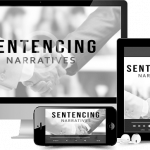Presentence Investigation Report:
It’s Sunday March 8th. I decided to write this blog after receiving a message from a white-collar defendant. The defendant told me his lawyer told him to show up to his presentence interview with “nothing”. I told him he was making a mistake and that I would explain why when I called him. To help others prepare for their presentence investigation report, I decided to write this blog about the importance of bringing a narrative to the interview.

Presentence Investigation Report
Those who start early can use the personal narrative as a tool to influence the presentence investigation. After a defendant pleads guilty, or after a jury convicts a defendant, the next step will be for the defendant to meet with a probation officer. That probation officer will conduct an investigation that will culminate with a report known as the Presentence Investigation Report, or PSR.
During the presentence investigation report, the probation officer will ask the defendant whether he has anything to say about the offense.
A well-written narrative will show that the defendant has given a great deal of thought to why he is going to federal prison. That narrative can have an enormous influence on the journey ahead. Don’t take our word for it. We encourage our clients to listen to what federal judges have said about the personal narrative. If a defendant succeeds in weaving his personal narrative into the PSR, he can influence his journey through federal prison.
It’s never too late and it’s never too early to prepare for success.
A person may write the personal narrative before surrendering to prison. Or a person may write the narrative once he or she is in prison. Either way, we’re confident it will help.
- The personal narrative will clarify thoughts.
- A personal narrative will lead a person to define a success.
- Personal narratives will help the individual craft a plan.
- A personal narrative will help an individual establish priorities.
- And a personal narrative will motivate an individual to perform, or execute the plan.
Although a criminal indictment or conviction can feel like the end of the world, a personal narrative can set a person on a path to recalibration. It can lead to change. It can set a person on the pathway to success. That strategy of writing personal narratives worked for Shon Hopwood. It worked for me. And it worked for my partner, Michael Santos.
We also encourage people to recognize that the process doesn’t end with a sentencing hearing.
The person will surrender to prison. Then, a series of authorities will judge the individual at different intervals. Those authorities will always look to the PSR—and the prosecutor’s statements—when assessing the person. If an individual writes out his narrative, he can influence those eventual assessments.
Again, it’s never too early and it’s never too late to begin sowing new seeds. A good narrative will influence the way BOP staff will assess each prisoner. The narrative can influence where a person serves the sentence and what programs are available in prison. The narrative may influence liberty in prison, and influence when authorities will release a person to a halfway house. Once the sentence ends, the personal narrative can influence the level of liberty while on Supervised Release. It can even influence the career a person launches. The narrative may persuade authorities to advocate for early termination of Supervised Release.
In conclusion, expect prosecutors to paint the worst possible picture of any defendant.
As Jeff Sessions wrote in his Memorandum, they have a job of proving serious charges. Justice—in the eyes of many prosecutors—equates with convictions and long sentences. For defendants who want a better outcome, we encourage them to write personal narratives. We encourage them to use those personal narratives as blueprints. They lead to the next phase in the journey. They are essential to getting the outcome we want from a prison experience.
If you’re an individual who wants to redefine his life, then start with a personal narrative. Do it soon. The sooner you start on a personal narrative, the more time you can invest to craft it well. Do not write the narrative to sell to readers. Rather, use your personal narrative to sell you.
Justin Paperny
P.S. Learn more about the presentence investigation report in this video we filmed with Judge Bough.




